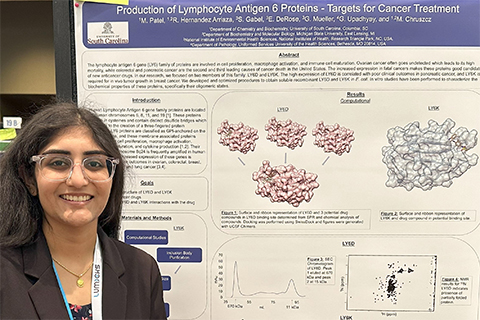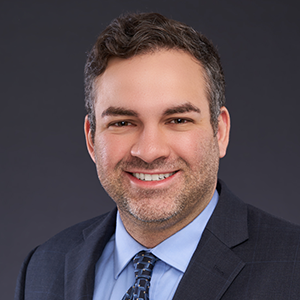Growing a chapter by building a network
When a member of Megha Patel’s family was diagnosed with medullary thyroid cancer, Patel, who was then in middle school, watched videos and read online to learn about the disease. When another relative had a kidney and pancreas transplant, but the patient’s body rejected the pancreas, Patel listened to conversations at the teaching hospital where the relative was treated, hoping to make sense of what was happening.
These experiences inspired Patel to focus on studying science. In a high school advanced placement biology class, she said, she finally began to understand her family members’ conditions. She also took AP chemistry and competed in the Science Olympiad, a national K–12 team program encompassing a variety of fields.

Patel, who grew up in Lexington, South Carolina, recently graduated from the University of South Carolina as a biochemistry and molecular biology major. She was a four-year member of the USC Student Chapter of the American Society of Biochemistry and Molecular Biology. She served as the chapter’s secretary in her sophomore year, treasurer in her junior year, and president in her senior year.
The chapter met online during the 2020–2021 school year, but over the next two years, Patel worked with the USC Undergraduate Research Office to organize panels of alumni and experts across multiple industries to discuss their career pathways. The chapter also participated in community outreach, judging middle and high school science fairs. These activities provided networking opportunities for members, but the chapter’s leaders thought something seemed to be missing.
While studying science in high school, Patel had cultivated a parallel humanistic interest starting with an AP course in geography that introduced her to concepts in sociology. She built on this in college by pursuing a minor in anthropology.
“Learning about different cultures is a nice switch from hard science classes,” she said.
Her interest in social connections guided her effort to address two challenges for the USC chapter: member recruitment and engagement.
In March, Patel attended Discover BMB in Seattle. It was her first ASBMB meeting, and she was the only USC chapter member there. “I felt tremendously overwhelmed,” she said. “Our chapter has roughly 20 members, whereas other schools have much larger chapters.”
Networking with undergraduate leaders from around the country and learning how they grew their ASBMB chapters provided Patel with a new vision for the USC chapter — community building.
“We need to distinguish ourselves from other organizations that specifically appeal to medicine, like premed fraternities, and more clearly show the value of our organization,” she said.
Patel decided the chapter should partner with other science, technology, engineering and mathematics organizations such as the American Chemical Society and Women in STEM to create a network that enhances the visibility of the individual groups. This network can collaborate on recruiting within the undergraduate population, provide members with resources such as fellowship and professional school application materials, and mentor fellow undergrads to get them started in research. Also, members are encouraged to explore each national society's professional development resources.
Having launched this partnership, Patel now aims to enroll in a two-year postbaccalaureate program at the National Institutes of Health to help her discover what science topics she is passionate about before she commits to graduate school.
“I am excited to explore a new city,” she said, “and have the independence to lead my own project that will allow me to continue my passion for structural biology while exploring a new research area of glycobiology.”
Enjoy reading ASBMB Today?
Become a member to receive the print edition four times a year and the digital edition monthly.
Learn moreGet the latest from ASBMB Today
Enter your email address, and we’ll send you a weekly email with recent articles, interviews and more.
Latest in People
People highlights or most popular articles

2026 ASBMB election results
Meet the new Council members and Nominating Committee member.

Simcox wins SACNAS mentorship award
She was recognized for her sustained excellence in mentorship and was honored at SACNAS’ 2025 National Conference.

From humble beginnings to unlocking lysosomal secrets
Monther Abu–Remaileh will receive the ASBMB’s 2026 Walter A. Shaw Young Investigator Award in Lipid Research at the ASBMB Annual Meeting, March 7-10 in Washington, D.C.

Chemistry meets biology to thwart parasites
Margaret Phillips will receive the Alice and C. C. Wang Award in Molecular Parasitology at the ASBMB Annual Meeting, March 7-10 in Washington, D.C.

ASBMB announces 2026 JBC/Tabor awardees
The seven awardees are first authors of outstanding papers published in 2025 in the Journal of Biological Chemistry.

Decoding how bacteria flip host’s molecular switches
Kim Orth will receive the Earl and Thressa Stadtman Distinguished Scientists Award at the ASBMB Annual Meeting, March 7–10, just outside of Washington, D.C.

